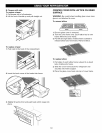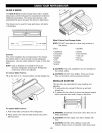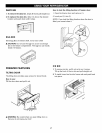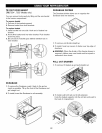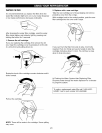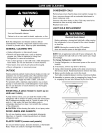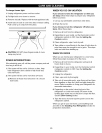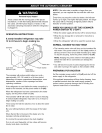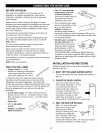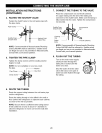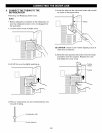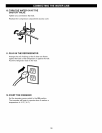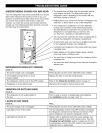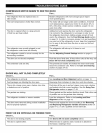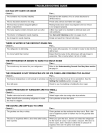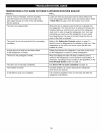
BEFORE YOU BEGIN
This water line installation is not warranted by the
refrigerator or icemaker manufacturer. Follow these
instructions carefully to minimize the risk of expensive
water damage.
Water hammer (water banging in the pipes) in house
plumbing can cause damage to refrigerator parts and lead
to water leakage or flooding. Call a qualified plumber to
correct water hammer before installing the water supply
line to the refrigerator.
To prevent burns and product damage, do not hook up
the water line to the hot water line.
If you use your refrigerator before connecting the water
line, make sure the icemaker power switch is in the O
(off) position.
Do not install the icemaker tubing in areas where
temperatures fall below freezing.
When using any electrical device (such as a power
drill) during installation, be sure the device is double-
insulated or grounded in a manner to prevent the hazard
of electric shock, or is battery-powered.
All installations must be in accordance with local plumbing
code requirements.
NOTE: Wear eye protection.
WHAT YOU WILL NEED
• Copper Tubing, 1/4" outer J_"
diameter to connect the refrigerator
to the water supply. Be sure both
ends of the tubing are cut square.
To determine how much tubing you need: measure
the distance from the water valve on the back of the
refrigerator to the water supply pipe. Then add 8 feet
(2.4 m). Be sure there is sufficient extra tubing (about 8 feet
[2.4 m] coiled into 3 turns of about 10" [25 cm] diameter) to
allow the refrigerator to move out from the wall after
installation.
• A cold water supply. The water pressure must be
between 20 and 120 p.s.i, on models without a water
filter and between 40 and 120 p.s.i, on models with a
water filter.
• Power drill.
• 1/2" or adjustable
wrench.
• Straight- and Phillips-
blade screwdriver.
Two 1/4" outer diameter
compression nuts and
2 ferrules (sleeves) to
connect the copper tubing to
the shutoff valve and the
refrigerator water valve.
If your existing copper water
line has a flared fitting at the
end, you will need an
adapter (available at
plumbing supply stores) to
connect the water line to the refrigerator OR you can
cut off the flared fitting with a tube cutter and then use
a compression fitting.
Shutoff valve to connect to
the cold water line. The
shutoff valve should have a
water inlet with a minimum
inside diameter of 5/32" at
the point of connection to the
COLD WATER LINE. Saddle-type shutoff valves are
included in many water supply kits. Before purchasing,
make sure a saddle-type valve complies with your local
plumbing codes.
INSTALLATION INSTRUCTIONS
Install the shutoff valve on the nearest frequently used
drinking water line.
1. SHUT OFF THE MAIN WATER SUPPLY
Turn on the nearest faucet to relieve the pressure on
the line.
, CHOOSETHE VALVELOCATION
Choose a location for the valve
that is easily accessible. It is best
to connect into the side of a
vertical water pipe. When it is
necessary to connect into a
horizontal water pipe, make the
connection to the top or side,
rather than at the bottom, to avoid
drawing off any sediment from the water pipe.
, DRILLTHEHOLEFORTHEVALVE
Drill a 1/4" hole in the water f?==_
pipe (even if using a self-
piercing valve) using a
sharp bit. Remove any burrs
resulting from drilling the
hole in the pipe. Take care
not to allow water to drain
into the drill. Failure to drill a 1/4" hole may result in
reduced ice production or smaller cubes.
27



